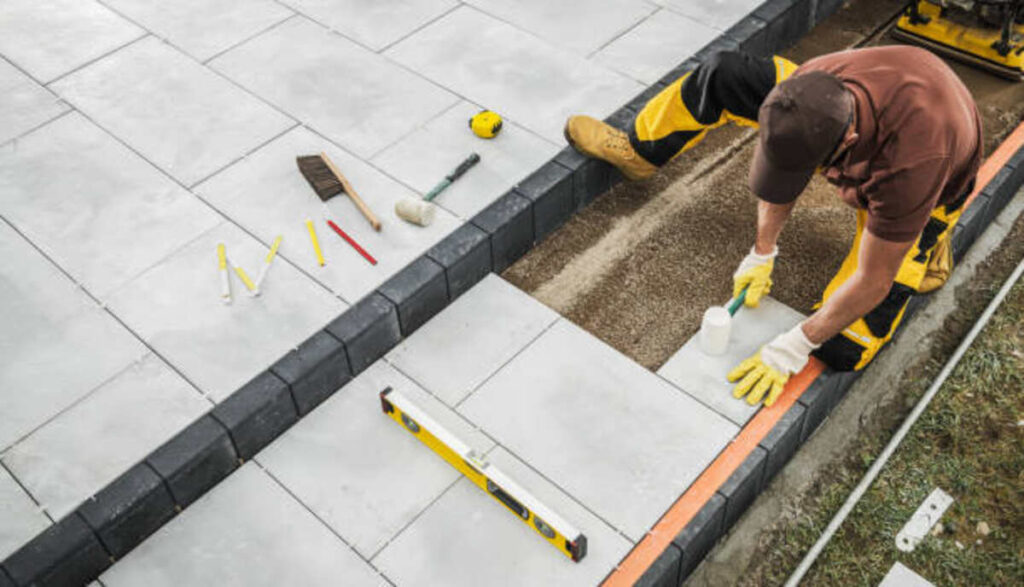When it comes to updating the appearance and functionality of your driveway or commercial parking lot, hiring reliable paving contractors is crucial. With so many contractors advertising their services, you might feel overwhelmed trying to choose the right team. This guide offers detailed insights into everything from licensing to site preparation, ensuring that you can make an informed decision and get superior results. Let’s dive right in. Obtain the Best information about Fairfield Paving Contractors.
1. Understanding the Scope of Paving Projects
Hiring paving contractors begins with a clear understanding of the scope of your project. Whether you’re looking to upgrade a small residential driveway or overhaul a large commercial parking facility, knowing the basic elements of your paving job is essential. This section will give you a foundation to determine the type of material you need, how to budget, and what factors might influence the overall timeline.
a. What Do Paving Contractors Do?
Paving contractors focus on the planning, design, and installation of various pavement structures. They handle:
- Driveways and Parking Lots: From excavation to laying asphalt or concrete
- Walkways and Paths: Creating safe, aesthetically pleasing walkways around homes or commercial areas
- Repairs and Maintenance: Fixing potholes, cracks, or major structural damages
- Resurfacing Projects: Applying fresh layers of asphalt or sealants to extend pavement life
You’ll often find contractors who specialize in particular areas, such as asphalt driveways or concrete walkways. By identifying the specific needs of your project—be it a basic driveway installation or a decorative walkway with patterned pavers—you can narrow down your contractor search significantly.
b. Common Types of Paving Materials
Different paving materials serve different functions and aesthetics:
- Asphalt
- Typically used for roads, driveways, and parking lots.
- Pros: Cost-effective, quick installation, easy maintenance.
- Cons: Prone to temperature-related cracks, requires periodic sealing.
- Concrete
- Ideal for long-lasting driveways, sidewalks, and patios.
- Pros: Highly durable, low maintenance, versatile finishes.
- Cons: More expensive than asphalt, labor-intensive installation, can crack without proper base.
- Pavers
- Usually made of concrete, clay, or natural stone and come in various shapes and colors.
- Pros: Attractive appearance, easy to replace individual units, slip-resistant options available.
- Cons: Higher upfront cost, requires proper jointing to prevent weed growth or shifting.
- Eco-Friendly Alternatives
- Some contractors offer permeable pavers or recycled asphalt.
- Pros: Better drainage, reduces environmental impact.
- Cons: May be costlier initially and require specialized knowledge for proper installation.
Choosing the right paving material depends on your budget, climate, aesthetic preferences, and the kind of traffic your paved surface will endure. In colder regions, for example, materials that expand and contract without major cracking (like certain asphalt mixes) can be beneficial.
c. Estimating Project Scale and Budget
Budgeting for a paving project starts with:
- Measuring Square Footage
- Calculate the area you want to pave to estimate material needs.
- Determining Material Costs
- Obtain standard pricing for asphalt, concrete, or paver units.
- Labor and Equipment Costs
- Expect contractors to charge hourly rates for labor and additional fees for heavy machinery or specialized tools.
- Contingency Buffer
- Set aside 10-15% of your total budget for unexpected costs like drainage issues or base repairs.
This thorough evaluation helps you articulate your needs to the paving contractors and allows them to produce an accurate quote.
Below is a quick reference table for typical paving materials and their general costs per square foot:
| Paving Material | Approx. Cost Range (USD) | Durability (Years) | Maintenance Frequency |
| Asphalt | $3 – $5 | 15 – 20 | Every 3-5 years (seal) |
| Concrete | $6 – $12 | 20 – 40 | Low |
| Pavers | $8 – $20+ | 25 – 50+ | Moderate |
| Eco-Friendly | $8 – $15 | 25 – 50 | Depends on material |
Make sure to weigh the upfront investment against the long-term maintenance and life expectancy of your pavement choice. With careful planning, you’ll avoid budget blowouts and ensure a successful project from the get-go.
2. Essential Credentials & Certifications to Look For
Before signing any contract, verify that your paving contractors meet industry standards. This due diligence not only protects your investment but also ensures you’re working with professionals who prioritize safety and quality.
a. Licensing and Insurance
Different regions have different licensing requirements. However, almost all reputable paving contractors will:
- Maintain a Valid License: Check with local regulatory agencies to confirm.
- Carry General Liability Insurance: Protects your property if accidents occur on-site.
- Workers’ Compensation: Covers employee injuries and prevents legal complications.
A legitimate contractor should offer proof of these documents without hesitation. If they’re reluctant to share, consider it a red flag.
b. Professional Affiliations
Many paving experts join professional associations to stay updated with industry best practices, emerging technologies, and ethical guidelines. Examples include:
- National Asphalt Pavement Association (NAPA)
- American Concrete Institute (ACI)
- Local homebuilders or contractors associations
Membership in these organizations often indicates dedication to quality workmanship and adherence to industry standards.
c. Checking References and Testimonials
It’s common to feel uneasy about spending thousands of dollars on a company you’ve never worked with before. Gathering feedback from previous clients can ease those concerns. Here’s how:
- Online Reviews: Check platforms like Google, Yelp, or the Better Business Bureau.
- Request a Portfolio: Ask for photographs of completed driveways, parking lots, or walkways.
- Speak with Past Clients: Request contact details of at least two to three recent clients.
Don’t ignore negative feedback, but also remember that no contractor has a 100% perfect record. Focus on how issues were resolved, as that often reflects their professionalism and willingness to put customers first.
3. Comparing Quotes and Bids
Once you’ve shortlisted a few reputable paving contractors, it’s time to gather quotes. Comparing these quotes effectively ensures you don’t just pick the lowest price, but the best overall value.
a. Evaluating Cost Breakdowns
A detailed bid should include:
- Material Costs: Type of asphalt, grade of concrete, or paver brand.
- Labor Estimates: The number of workers, estimated hours, and labor rate.
- Equipment Costs: Any additional machinery rentals or specialized tools.
- Cleanup and Disposal: Fees for removal of old pavement or debris.
If a quote seems surprisingly low or high, ask questions. The discrepancy might point to either missing elements or inflated rates. Reputable contractors will gladly explain their cost structure to help you make an informed choice.
b. Understanding Warranties and Guarantees
Warranties offer assurance that the paving job will meet industry standards. Pay attention to:
- Coverage Period: Typical coverage for paving can range from one to two years.
- Inclusions and Exclusions: Some warranties only cover material defects, while others also include labor.
- Performance Guarantees: Contractors might guarantee that your driveway won’t crack for a specified period, depending on proper maintenance.
Request warranty details in writing. This documentation safeguards you if issues arise months after the job is complete.
c. Negotiation Tips
There’s often room for negotiation, but aim for a win-win scenario. Here are a few negotiation tactics:
- Bulk Project Discount: If you have multiple areas to pave, ask for a bundle rate.
- Flexible Scheduling: If your project can wait until the contractor has a gap, they might reduce costs.
- Cash or Early Payment Discounts: Some contractors offer small percentage discounts if you pay promptly.
Don’t push too hard for rock-bottom prices; a drastically low quote might result in shoddy workmanship or subpar materials. Balancing affordability with quality ensures you’ll be satisfied for years to come.
4. Timeline, Planning & Communication
Effective communication with your paving contractors forms the foundation of a smooth, timely project. Setting clear milestones and expectations helps you anticipate any challenges that could arise.
a. Project Timeline Essentials
Your project’s schedule hinges on factors like:
- Extent of Excavation: Removing old pavement or leveling large areas.
- Weather Conditions: Most paving materials require stable temperatures and minimal precipitation.
- Material Availability: Unique pavers or high-grade asphalt may have longer lead times.
- Number of Workers: More hands on deck often speeds up the job.
Agree on a start date and estimated completion date. While no contractor can predict the weather or supply chain disruptions perfectly, an experienced team should provide realistic estimates.
b. Handling Unexpected Delays
Even the most meticulously planned projects can encounter hiccups. Common causes include weather, equipment breakdowns, or unforeseen site conditions like soft soil that requires additional stabilization. You can:
- Discuss Contingency Plans: An extra day or two in the schedule can buffer minor setbacks.
- Stay in Touch: Regular updates help you promptly address emerging issues.
- Prioritize Safety: Rushing to meet deadlines can compromise quality and lead to accidents.
A confident contractor will remain transparent and proactive about resolving delays, ensuring you’re not left in the dark.
c. Maintaining Ongoing Communication
Great communication ensures both parties stay aligned:
- Designated Point of Contact: Decide if you’ll be in touch with the project manager or the owner.
- Regular Check-Ins: Weekly or even daily updates, depending on project length.
- Documentation: Request email summaries of any major decisions or changes.
Establishing a collaborative environment from the get-go ensures misunderstandings are minimized, and the final result matches your expectations. After all, a well-paved driveway or parking lot often stands out, not just for its functionality but also for its craftsmanship.
5. Worksite Preparation & Environmental Considerations
Ensuring smooth paving starts long before the first layer of asphalt or concrete is laid. Adequate site prep and eco-friendly approaches can make a world of difference in the final quality of your project.
a. Pre-Project Site Inspections
Before any work commences, your paving contractors should inspect the site thoroughly:
- Soil Testing: In some cases, especially for large or high-traffic areas, checking soil composition can help predict future issues like sinking.
- Drainage Assessment: Proper drainage prevents standing water, which can accelerate pavement deterioration.
- Utility Checks: Locating underground pipes, cables, or sewage lines avoids costly damages or service disruptions.
By addressing potential pitfalls early, you’ll reduce the risk of surprise costs and project delays.
b. Environmental Impact
Sustainability is a growing priority for homeowners and businesses alike. Eco-friendly paving methods can include:
- Permeable Pavers: Allow water to seep through, reducing runoff and helping recharge groundwater.
- Recycled Materials: Reclaimed asphalt pavement (RAP) can cut waste and costs.
- Cool Pavements: Lighter-colored pavements reflect heat, lowering the urban heat island effect.
If you value green construction, discuss your preferences with potential contractors. Some are adept at sustainable practices, such as using lower-energy processes or recycling on-site materials whenever possible.
c. Minimizing Community Disruption
Paving projects can be noisy and dusty, not to mention the traffic disruptions. However, conscientious planning can lessen the impact on neighbors or patrons:
- Notify Neighbors or Tenants: A courtesy note or email detailing start dates and expected completion.
- Dust and Noise Control: Some contractors utilize water trucks or special equipment to keep debris at bay.
- Traffic Management: Setting up clear detours or scheduling work during off-peak hours can ease congestion.
Nobody wants to be the cause of neighborhood grumbles. A thoughtful approach ensures a smoother project for everyone involved.
6. Quality Assurance & Final Checks
By this stage, you’ll be well on your way to enjoying your newly paved surface, but don’t skip important quality checks and finishing touches that protect your investment.
a. Inspections During Construction
Spot-checking quality at key stages prevents small mistakes from spiraling into costly repairs:
- Base Preparation: Ensure the sub-base is compacted evenly before asphalt or concrete goes down.
- Material Thickness: Verify the thickness of each layer meets contract specifications.
- Edge Support: Strong, clean edges help maintain structural integrity and aesthetics.
A professional contractor is open to client walk-throughs and welcomes questions. After all, you’re paying for a job well done, and their reputation hinges on delivering just that.
b. Safety Protocols
An accident-free site is a testament to thorough planning and respect for everyone’s well-being:
- Personal Protective Equipment (PPE): Helmets, gloves, ear protection, and other relevant safety gear.
- Clear Signage: Mark closed areas with barricades or reflective signage.
- Worksite Cleanliness: Proper disposal of debris and ensuring equipment is stored safely at day’s end.
Not only is this integral to following legal guidelines, but it also fosters a sense of trust between you and your paving contractors.
c. Post-Project Review
Once the final layer sets:
- Visual Inspection: Check for even color, smooth transitions, and consistent thickness.
- Drainage Test: Ensure water doesn’t pool in unexpected spots.
- Snag List: List any minor defects like small cracks, uneven edges, or surface bubbles.
- Sign-Off: Final paperwork acknowledging project completion and warranty details.
A thorough wrap-up helps you confirm that everything meets your expectations and the agreed-upon plan. Don’t be afraid to speak up if something seems off. Reputable contractors often provide a short grace period for minor touch-ups.
7. Maintenance & Long-Term Considerations
You’ve invested considerable time and money into hiring paving contractors to create a solid, long-lasting surface. Now it’s time to preserve that investment.
a. Scheduling Routine Maintenance
Every pavement type benefits from regular upkeep:
- Asphalt
- Sealcoating every 2-3 years to protect against UV damage and water intrusion
- Pothole Repairs before they expand
- Concrete
- Crack Filling to prevent moisture seepage and freeze-thaw damage
- Gentle Cleaning with mild detergents to remove stains
- Pavers
- Replenish Joint Sand to keep pavers from shifting
- Weed Control in joints to maintain a neat look
Ignoring small issues can lead to expensive fixes down the road, so a preventative strategy pays off.
b. Tips for Seasonal Care
Climate significantly impacts paving materials. Colloquialisms aside, if you’re dealing with scorching summers or brutal winters, you’ll want to:
- Winter Care: Use gentle de-icers on concrete, avoiding rock salt that might degrade the surface. Keep snow shovels with plastic edges to avoid gouges.
- Summer Care: For asphalt, spray surfaces with water on extremely hot days to reduce surface heat and prevent oils from forming.
- Rainy Seasons: Maintain good drainage by clearing debris from edges and ensuring any catch basins function properly.
By adopting these seasonal best practices, your driveway or parking lot will look fresh and function effectively for decades.
c. Planning for Future Upgrades
Are you thinking ahead about expansions, landscaping, or additional features like decorative borders? Paving decisions can serve as a foundation for future improvements:
- Adding Curbs or Edging: Helps control water runoff and offers a neat appearance.
- Installing Lighting: Illuminated driveways or parking lots enhance safety and aesthetics.
- Landscaping: Surround paved areas with greenery or flower beds to create a welcoming entrance.
Keep these possibilities in mind when discussing the project layout with your paving contractors. It’s easier and often more cost-effective to incorporate certain elements into your initial plan than to retrofit them later.
FAQs
How do I find reputable paving contractors in my area?
Start by checking local business directories, reading online reviews, and asking neighbors or friends for referrals. Verify licenses, insurance, and references to ensure reliability.
Is it okay to pave during colder months?
Generally, asphalt and concrete work best in temperatures above 50°F. Cold weather can affect curing times and the final strength of the pavement. If paving in cooler conditions is necessary, contractors may use special mixes or additives.
How long should I wait before driving on a newly paved surface?
For asphalt, wait at least 24-48 hours. Concrete generally requires up to 7 days for partial curing, but full strength might take 28 days. Always follow contractor recommendations for optimal results.
Are eco-friendly paving options as durable as traditional materials?
Permeable pavers and recycled asphalt can be equally durable if installed correctly. Ensure your contractor has experience with sustainable materials and methods.
What should I do if I notice cracks forming soon after installation?
Contact your paving contractors right away. Small hairline cracks are sometimes normal, but larger or rapidly spreading cracks could indicate an issue with the base or installation process.
Can I negotiate the price with my chosen paving contractor?
Yes, as long as you approach it reasonably. Most contractors are open to discussing discounts for multiple projects or flexible scheduling. Just be wary of pushing the price too low, as it could compromise quality.
Conclusion
Hiring paving contractors requires thorough research, clear communication, and well-defined expectations. From verifying credentials and comparing quotes to ensuring a robust project plan, each step lays the groundwork for a successful outcome. Don’t forget the importance of ongoing maintenance and future-proofing your space. The right contractor will not only install a durable, visually appealing surface but also guide you on caring for it, season after season.
For more information on standards and best practices, you could explore resources provided by the American Society of Civil Engineers (ASCE). Remember: Investing the time to choose the right paving contractor now will save you headaches and expenses down the line.
Thank you for reading, and here’s to smooth driveways, thriving parking lots, and a job well done!



